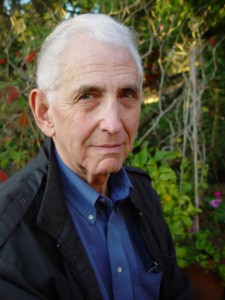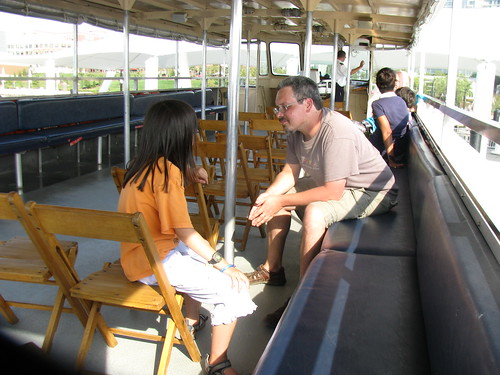|
|
Saturday, June 11th, 2011
Here are a couple of poems I have written recently. Experimenting with story-telling and with prosody.
Horizon
The best-laid tracks converge, they meet
way out there by the setting sun
confounding engineering dreams perspective in the desert
where the train runs off the vanished rails and crashes, yes,
it's tragic, sad-sack Sam the goldrush pioneer will never see his lover
who was riding west to meet him, look how Jesse and his outlaws
are confused, the hold-up won't play out, they may just ride their horses over the edge behind the train or else perhaps they'll turn back just in time, they'll skirt impending doom and spend their days retelling stories of the one that got away.
Crystal Armies
Fit the image to the meter
We can print it when you're done
When the armies that you're dreaming
Wander sleepy off the page and
Wave their effervescent banners
To the rhythm of your drum.
Marching softly, scarcely there,
You have to strain to make them out
Their dusty footprints on the pages
Almost like a printer's error
When they finally encamp
Inside your thawed out cerebellum
They'll build ghostly fires and sing
About the journeys of their fathers
And you'll scratch your forehead wondering
(In your clarity of vision)
Where the simple, crystal image
Of your verbal armies went.
I'd like to thank Pelele of Muchacha Recostada, who has posted what I believe to be a great poem, Mutilaciones (from 2009) -- my working definition of a great poem is one the reading of which alters how you read and write poetry -- I believe that "Mutilaciones," with its frantic, driving meter and its clarity of vision, will have a permanent effect on my reading of poetry and on my poetic output. "Crystal Armies" is written strongly under the influence of Pelele's piece. I'm working on a translation of "Mutilaciones"* which will be my first time (even dreaming of) translating a metered poem -- I do not think I am going to be able to keep the rhyme, but the meter is coming through very naturally.
 * Update: translation is here.
posted morning of June 11th, 2011: Respond
➳ More posts about Poetry
|  |
Thursday, June 9th, 2011
En el sur de Chile este fin de semana estalló el volcán Puyehue y expulsaba un océano de ceniza al cielo. The Atlantic publica unas fotografÃas magnificas de la ceniza y el fuego y los relámpagos:
 foto por Claudio Santana
posted evening of June 9th, 2011: Respond
➳ More posts about Pretty Pictures
|  |
Wednesday, June 8th, 2011
 Daniel Ellsberg is interviewed by CNN's Jay Kernis, producer of "In the Arena" -- he believes that Richard Nixon, if he were alive today, "would probably feel vindicated (and envious) that ALL the crimes he committed against me–which forced his resignation facing impeachment–are now legal." You can watch PBS's documentary on the Pentagon Papers, The Most Dangerous Man in America, online next week on Monday and Tuesday. Daniel Ellsberg is interviewed by CNN's Jay Kernis, producer of "In the Arena" -- he believes that Richard Nixon, if he were alive today, "would probably feel vindicated (and envious) that ALL the crimes he committed against me–which forced his resignation facing impeachment–are now legal." You can watch PBS's documentary on the Pentagon Papers, The Most Dangerous Man in America, online next week on Monday and Tuesday.
Elsewhere (and linked only by way of the disgust I feel for the malefactors), you can read about Cisco's outrageous abuse of the US and Canadian legal systems (and about the US Justice Department's cooperation) at Naked Capitalism.
posted evening of June 8th, 2011: Respond
➳ More posts about Politics
|  |
Tuesday, June 7th, 2011
 Justin Erik Halldór Smith has posted a fine essay on the names of mushrooms -- names fraught, at least in the cultures of Western Europe, with references to death and sickness, names richly and comicly multifarious; names which are "just folk terms, and so, since the beginning of the 18th century anyway, are not the real names of anything. Or at least that's what we're supposed to believe." Justin Erik Halldór Smith has posted a fine essay on the names of mushrooms -- names fraught, at least in the cultures of Western Europe, with references to death and sickness, names richly and comicly multifarious; names which are "just folk terms, and so, since the beginning of the 18th century anyway, are not the real names of anything. Or at least that's what we're supposed to believe."
Found via a link at LanguageHat, where the discussion in comments is lively and worth while as always.
 Elsewhere: John L. Trapp's preliminary catalog of bracket fungi in Berrien Co., Michigan, includes a lovely photo of a wood-ear mushroom called "Dryad's Saddle."
posted evening of June 7th, 2011: Respond
➳ More posts about Language
|  |
Monday, June 6th, 2011
18 Years! Your marriage is now old enough to be drafted, but not to drink! Congratulations, here's to many more years together.
posted morning of June 6th, 2011: 1 response
➳ More posts about Birthdays
|  |
Sunday, June 5th, 2011
My experiences this past week or so with reading Beckett's Comment C'est were leading me to wonder where the distinction lies between poetry and novel -- in his introduction Richard Seaver refers to Beckett's work as a novel, but very soon after I started reading it I had the thought, this is not a novel, it's a long poem. What did I mean by saying that? A key difficulty I have with long poems (not considering epic narrative verse here) is not being able to put them down and then pick them back up in the middle -- every time I pick up Comment C'est I commence on the first page, because there is not any story line for me to keep track of or characters (besides Beckett himself) or any of the sort of progression and development that I expect to see in a novel. This keeps me from getting anywhere with the book (beyond loving the opening pages anyways), because it is much too long to read all of in a single sitting. In a sort of funny coincidence, I was having a similar problem with the much shorter long poem Canto de guerra de las cosas, by JoachÃn Pasos -- as I wrote below, it is simply too much imagery for me to absorb all at once... Likely a successful reading strategy for the Beckett piece would involve focusing on little bits of it at a time, not on trying prematurely to integrate the pieces together. When I hit on that question -- what do I mean by calling the Beckett poetry "rather than" fiction -- my initial response was along the lines of, well, no plot, no characters, no development, the meat of the piece is its language and the imagery called forth. But, well, language and imagery are of primary importance in many of my favorite novels, ones that I categorize as fiction with no questions. Narrative quality is a key point -- Comment C'est is not a narrative in any sense that I can see. But there are poems (again disregarding epic) that tell stories, and that I don't hesitate to call poetry or confuse with fiction... I think where this is headed is that there is a wide space between the two categories, that individual works can be in one category but have attributes of the other. And somehow I always just seem to know instinctively which category the work I am reading belongs in.
posted evening of June 5th, 2011: Respond
➳ More posts about Samuel Beckett
|  |
|
¿Cómo puedo entender el «Canto de guerra de las cosas»? JoachÃn Pasos me parece periodista incrustado en el ejército de la existencia... Es un poema largo, 19 estrofas, 150 lÃneas, cada lÃnea (casà cada lÃnea) dibujando su propia imagen y cada estrofa surgiendo de estas imágenes en un cuadro complejo y múltiple. Todo junto es demasiado (para mÃ) para mantener... Me parece que el mejor camino de entender el poema entero y también de traducirlo, es bien entender cada lÃnea y cada estrofa, trabajar desde las raÃces del árbol más bien que intentar todo en una vez comprender.
posted morning of June 5th, 2011: Respond
➳ More posts about Poets of Nicaragua
|  |
|
Scruss built a banjo! A fretless banjo to be specific, with a gourd for a body: a genre of instrument I did not even know existed but which apparently has plenty of history behind it. Here he is playing "Black-eyed Suzy":
More images and recordings at scruss' blog.
posted morning of June 5th, 2011: 1 response
➳ More posts about Music
|  |
Saturday, June 4th, 2011
John and I have been tossing around Don Dixon's "Praying Mantis," playing it now and then for most of the time we've been jamming together. We're thinking of it now as one of the songs to play at the next open mic we play -- here's a version of it we recorded tonight:
posted evening of June 4th, 2011: Respond
➳ More posts about Mountain Station
|  |
For I reckon that the sufferings of this present time [are] not worthy [to be compared] with the glory which shall be revealed in us. For the earnest expectation of the creature waiteth for the manifestation of the sons of God. For the creature was made subject to vanity, not willingly, but by reason of him who hath subjected [the same] in hope, Because the creature itself also shall be delivered from the bondage of corruption into the glorious liberty of the children of God. For we know that the whole creation groaneth and travaileth in pain together until now. -- The letter of St. Paul to the Romans
Chapter â…§: 18-22
King James version
For a long time I have been wondering how a translation of JoachÃn Pasos' Battle-song: The War of Things might best preserve the voice of the poet. Throughout the poem he is addressing vosotros, the explicitly familiar, explicitly plural second person which does not exist in English. Turns out the key is the epigraph to the poem.For an epigraph, Pasos quotes from the Vulgate version of the above verses of Romans; but he prefaces the quotation with "Fratres:" -- "Brethren:", which is not part of these verses. Paul's letter is addressed to his brethren the Roman Christians, so this insertion makes good sense. And if you read Pasos' poem as a continuation of Paul's address to his brethren, then the familiar second-person plural is clear from context. This morning I had what seems to me like a good idea for a non-literal translation of the poem's third stanza:
Give me a motor, a motor stronger than man's heart.
Give me a robot's brain, let me be murdered painlessly.
Give me a body, metal body without and within another metal body,
just like the leaden soldier's who never dies,
never begs oh Lord, your grace, let me not be disgraced among your works
like the soldier of mere flesh, our feeble pride,
who will offer, for your day, the light of his eyes,
who will take, for your metal, take a bullet in his chest,
who will give, for your water, give back his blood.
Who wants to be like a knife, like one no other knife can ever wound.
(With liberal borrowings from Steven F. White's more literal translation.) This poem reminds me strongly of León Ferrari's paintings of armaments. Remember that the poet is addressing his brethren: He is asking for these cybernetic enhancements not from his God but from his peers.
posted morning of June 4th, 2011: Respond
➳ More posts about Readings
| Previous posts
Archives  | |
|
Drop me a line! or, sign my Guestbook.
•
Check out Ellen's writing at Patch.com.
| |

